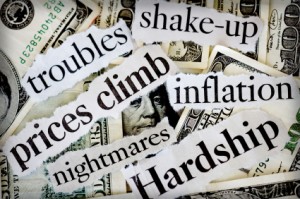 [1]Anxiety. Stress. Worry. In other words, fear. Yet if you are worried about money, it could be your very own fear that keeps you counting pennies and anxious over dollars.
[1]Anxiety. Stress. Worry. In other words, fear. Yet if you are worried about money, it could be your very own fear that keeps you counting pennies and anxious over dollars.
The impact of fear is felt in the body at a cellular level. Even when you don’t realize it, fear works on your brain chemicals to influence your emotions and your behaviors. Rooted in the amygdala, a primal part of the brain, fearfulness sends messages through the nervous system that can alter neurological functions and memory according to research from Bryn Mawr College.
It can also keep you poor, blind you to the wealth-building opportunities around you, and strip away the enjoyment of any money that you do have.
Fear and Wealth Perceptions
When you’re fearful, you are living a place of worry, anxiety, and concern. Stressed about actual bills as well as probable bills, possible bills, and wild scenarios, your number one concern becomes protecting what you have and hoarding for the future. However, just like a squirrel furiously tucking away reserves for winter, your perceptions of what you have and where you have it aren’t necessarily accurate.
Fear introduces the idea that there is never enough . . . and raises the possibility that there will never be enough. Tormented by this perception, even if you are doing all that you need to be doing to prepare your finances for the future, you won’t feel at peace or secure. While others might look at your situation and be envious, you will be locked in a state of panic and stress.
Fear and Missed Opportunities
In addition to the perception of poverty, fear makes you more likely to earn less and reap less from your investments. It’s not simply a matter of being rightfully risk adverse in a world full of pitfalls – it’s also that fear clouds your judgment about opportunities that come your way.
A study of human behavior in the face of fear and uncertainty performed by the economists Uri Gneezy, John List and George Wu quantified how much fear cost participants. In the study, participants had the chance to purchase opportunities to win a gift certificate valued at $100. Given the odds, rational participants paid between $26.10 and $45 for the chances. Fearful participants, on the other hand, were willing to offer only $16, effectively removing any chance that they might win, as reported by the Wall Street Journal. The economists concluded that fear makes every possibility seem less attractive, making people less likely to pursue good opportunities simply because they are feeling fearful.
Leaving Fear Behind
If fear is coloring your judgment and ruining your chances of acquiring wealth and enjoying wealth, what can you do? It’s not necessary to submit to a life of fear, anxiety, and want. Instead, you can take matters into your own hands by addressing your fears in three ways:
- Remember the strength of faith. You do not have to be afraid or feel alone in this world. “For God hath not given us the spirit of fear, but of power, and of love, and of a sound mind,” II Tim 1:7 and “In God have I put my trust: I will not be afraid what man can do unto me.” Psalm 56:11.
- Remember the power of perspective. You do not have to consider your challenges alone, walled in by your own fears. Bring them to your friends and your family to get additional perspective, or here in the comments. There are plenty of people who share your outlook who can offer their perspective on your situation, shedding light and logic on items that may be keeping you fearful unnecessarily.
- Remember your own talents and abilities. Take out a piece of paper and make a list of all the things you can do. Start with the small things if it makes it easier – you can give powerful hugs, open jars, and appreciate the beauty of this world. Keep your list going for as long as you can, and don’t throw it away when you’re finished. Store it somewhere you can see it whenever you might need support, and remember that you are uniquely created with your own set of talents and abilities – so revel in them and make the most of them!
Fear is a powerful emotion, but you do not have to let it dominate your life or trap you in a spiral of poverty. You can loosen its grip on your thinking, clear your judgment, take advantage of more opportunities to improve your financial situation, and properly enjoy the fruits of your labors.